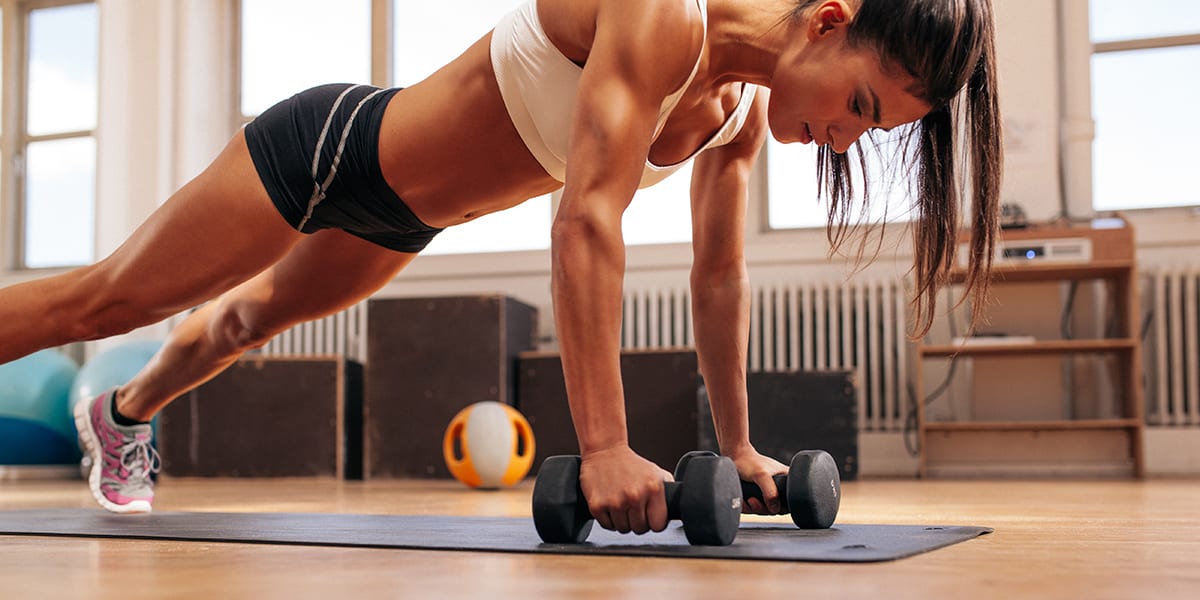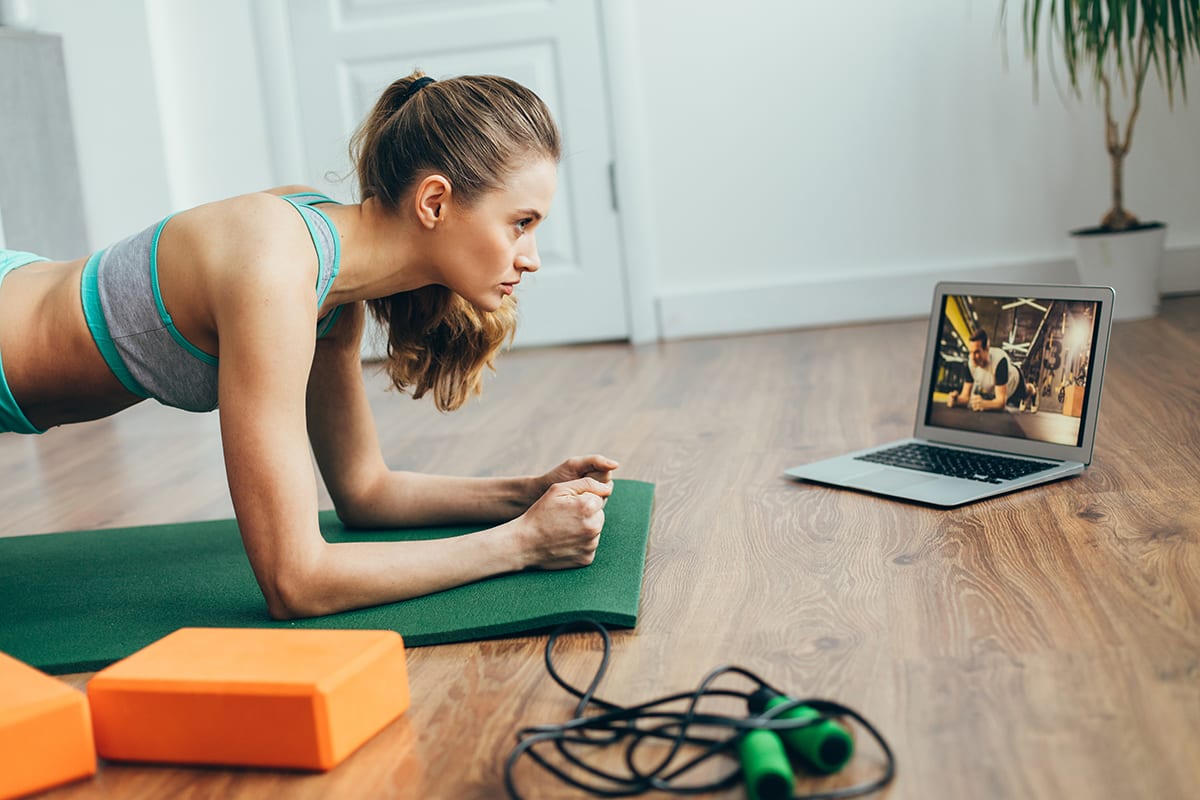Last Updated on August 2, 2024 by Nicole
We all get extra busy sometimes. Going to the gym isn’t always an option, but that’s okay! You don’t have to sacrifice your workout routine altogether. The good news is that home workout plans can also be extremely effective. In fact, there are several benefits to exercising in your home, including convenience, privacy and efficiency with one’s time! Better still, these are all benefits that most people do not typically associate with “going to the gym”. You could also do a home workout for couples if that’s your thing.
Aside from the home workout plan benefits listed above, it’s also a great way to become creative with your workouts. Especially when it comes to challenging your muscles, it’s important to mix things up. Doing so can help you see tremendous results – ones that may even be better than those of a person who has all the bells, whistles and equipment at their disposal in a commercial gym setting!
In this article, I’m going to discuss specific methods to get the most bang for your buck with your very own home workout plan. I’ve also provided videos that include specific at-home workouts for you to perform. Choose those that you think would be most beneficial and remember to make adjustments based on your body’s feedback. Never exercise to the point of severe aches, pains or even worse injuries.
Consistency Is Key
First and foremost, one of the most important aspects in ANY home workout plan is incorporating variety. This is very important when it comes to staying consistent with your workout plan and avoiding boredom after one or two weeks. The fact that you can workout in your home is amazing for all of the reasons I listed in the first paragraph, but this also means that you are now accountable for yourself.
Unless you have a workout partner to execute this home workout plan alongside you, it is up to you to make sure that you complete the workout each and every day that you have planned. It is important that the home workout plan you ultimately follow is one that you do not get bored with after a week or two.
Scientists at the University of Florida actually found in an eight-week study that participants were more likely to stick to their workout program during the study if it incorporated variety vs. stayed the same (1). The study suggests that simply alternating aerobic (cardio), anaerobic (resistance training), and flexibility specific days would be a great method to ensure there is enough variety. What does this mean for your home workout program? Change is necessary if you want to stay consistent!
Mixing It Up
Aside from consistency, it is important to maintain variety in your home workout plan to make sure you avoid plateaus. When we begin training in a certain way, our body is shocked and adapts to that stress by becoming stronger, faster, leaner, etc. On the contrary, when your body adapts to this new stimulus, we endure what is known as a plateau. This is essentially a period where the rate at which you were experiencing improvements in your physique, endurance and/or strength has decreased.
The body tends to adapt to specific stimulus from exercise routines around six-eight weeks (2). This is a common place to see people stop their workout routine all together because the lack of results leads to them feeling discouraged. At this point, however, it’s important to stay focused and double down by making a change to your routine.

Working the Same Muscles Differently
There are several ways you can switch up your home workout plan without any additional equipment! But first, it’s important to understand that our muscles perform three types of contractions: eccentric, concentric and isometric.
Eccentric muscle contractions are performed when you’re lengthening the muscle under a load in a controlled manner. For example, sitting down slowly on a chair, you feel your quads contracting as your knees bend, even though the job of the quads is to straighten the knee. In fact, you’re actually lengthening the quads. However, since you’re controlling the descent into the chair, you’re forcing the quads to stay active, causing muscle breakdown and ultimately muscle growth through recovery.
The second kind of contraction is called a concentric contraction. This is when your muscle performs its natural action and shortens. For example, when you perform a bicep curl, your bicep is responsible for bending the elbow, and it is actively working to help you do just that. The last form of contraction is called an isometric contraction. This happens when you see two evenly matched arm wrestlers unable to move the other. Their muscles are in action, but there is no movement.
As we’ve now seen all the ways a muscle can contract, we know that there are several ways to force the targeted muscles to engage. Applying these methods, you can easily and continuously challenge yourself with a home workout plan that doesn’t require any equipment.
Speed, Intensity and Compound Exercises

Next, you can adjust the intensity of the movement by doing extremely slow reps vs. extremely fast reps. Moreover, you can add plyometrics into your home workout plan to really increase intensity and coordination requirements. This would be especially suitable if your joints can endure some jumping and more impact.
However, another way to increase the intensity of a workout would be to perform high intensity interval training (also known as HIIT) vs. your run-of-the-mill three or four sets of 10 routines. By doing high-intensity interval training, you’re going to not only stimulate the fast twitch muscle fibers but also overall increased growth. Studies show that high-intensity interval training has a greater effect on fat oxidation than other forms of exercise (3).
Finally, one of the most important aspects of an effective home workout plan is that you’re performing compound exercises. This means you’re performing exercises that require more than just one joint to execute. Since you don’t have equipment, you must find every way possible to challenge yourself at the highest rate. In most cases, this requires exercises that are challenging and result in a high number of calories burned when performing them. Exercises like squats, push-ups, burpees, bridges and planks are great for executing compound exercises.
Watch and Learn

Now that we know that it is important to implement variations in our exercise in order to stay compliant with our home exercise program, we can maintain our results over a long period of time. We also know that by adding variety to our home workout plan, we have the best chance to avoid plateaus so that we can see more consistent results.
Most importantly, we also know that in order to see the best return on our workout in terms of difficulty and caloric expenditure, we need to perform multi-joint, compound exercises. These should also include some high-intensity interval training.
By implementing and sticking with an effective, dynamic home workout plan, you can see great results consistently. So don’t let working out become a time or convenience issue – there is simply no excuse! Below are some great home workouts that can be utilized for a variety of muscle groups and fitness levels!
Leg HIIT Training
Full Body HIIT Training
Do this 5 Rounds with a 20 second on 10 second off time frame. Rest no longer than 1 minute in between each round…Good luck!
Upper Body Home Workout
Eccentric Contraction Home Workout
Explosive Home Workout
3 Amazing Set Activewear Brand Picks for the Summer
We all know that moving our bodies is ideal for our wellness, but sometimes we want…
A Beginner’s Guide to Creatine Gummies: Empowering Wellness
In the pursuit of optimal health and fitness, individuals often seek effective strategies to enhance…
Core Ball Exercises: 5 Creative Ways You Can Tone Your Stomach Effectively
Core Ball Exercises: 5 Creative Ways You Can Tone Your Stomach Effectively If you want…
8 Common Fitness Myths: Unveiling the Truth Behind Exercise Misconceptions
Unveiling the Truth Behind Exercise Misconceptions! The world of fitness has many dos and don’ts….
9 Healthy Postpartum Diet Tips for Post-Pregnancy Weight Loss
Having a baby and becoming a mother are some of the most amazing experiences that…
8 Highly Effective Ab Workouts Using Just Your Body Weight
With summer around the corner, a goal for fitness enthusiasts and beginners alike is to…





